The Holy Orthodox Church is running over with Saint Gregorys. I wrote last year about “Another great Saint Gregory” – Gregory of Nyssa. (If you’d like to read it, go to the far bottom right of this page, and scroll down to January 2022.)
Before we get to this year’s great Saint Gregory the Theologian, I’m going to list some of the greatest Gregorys in hope that maybe I can keep them straight. (After all these years I still get them confused.) Here they are in “liturgical” order, the Church year beginning on September 1, as it does.
September 8 – Saint Gregory the Great, Pope of Rome, prolific author, visionary reformer, who sent Saint Augustine to convert England. Even if he didn’t invent Gregorian Chant, he encouraged that style of chanting so enthusiastically that it is named after him. (He deserves an article here sometime.)
November 14 – Saint Gregory Palamas, monk of Mount Athos, later Archbishop of Thessaloniki. Defender and promoter of Hesychasm, the prayer of the heart, the Jesus Prayer, in opposition to the Western scholastic approach. (Too much to explain here. We should have a Post about it sometime.) Also commemorated on the Second Sunday of Great Lent.
January 10 – Saint Gregory of Nyssa – brother of Saint Basil the Great, not a very successful bishop, but a brilliant defender of the Faith and writer, largely responsible for the third section of the Creed regarding the Holy Spirit.

January 25 – Saint Gregory the Theologian. Archbishop of Constantinople – often improperly called Saint Gregory of Nazianzus or Saint Gregory Nazianzen. (More about that in a minute.) He’s also commemorated on January 30, the Feast of the Three Hierarchs along with Saint Basil and Saint John Chrysostom, and on January 19, the date of the Translation of his Relics, which is our excuse for talking about him this week.
There are also literally dozens of other Saint Gregorys. * I think I’ve got these greatest ones straight. If not, will someone please comment below quickly, so I can make corrections before I embarrass myself any further.
- My advice to couples who are expecting a boy: If you want him to amount to something, name him “Gregory”.
All the above was by way of introducing today’s Gregory:
Saint Gregory the Theologian, Archbishop of Constantinople
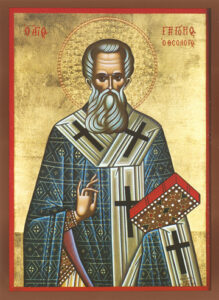
Why do I call him great? Because he is one of only three saints in all history whom the Orthodox Church has titled “The Theologian”: 1 Saint John the Theologian, Apostle and Evangelist, closest companion to our Lord Jesus Christ. 2 Saint Simeon the Theologian, tenth century poet of Divine Love. 3 Our Saint Gregory the Theologian today.
Gregory was born in the year 339 in the town of Nazianzus in Cappadocia in central Asia Minor. (Its location is unknown today.) His father, also named Gregory, was a convert to the Faith who became Bishop of Nazianzus. * Our Gregory received a solid Orthodox education at home, then in Palestine and Alexandria. After that he went to Athens for classical studies, where he became a lifetime friend with a young man named Basil, later to become Saint Basil the Great.
- His father is also listed among the saints, as are his mother Nonna, his brother Caesarius and his sister Gorgona. The title “Saint Gregory of Nazianzus” properly belongs to his father. However very often if you look up “Saint Gregory of Nazianzus” you’ll find the story of his son Gregory. Do we all find this confusing? Yes we do!
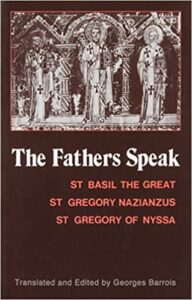
For a while Gregory joined Basil in his experimental monastery in the wilderness – the rigors of which were more that he could handle, and he returned to Nazianzus. In this little book The Fathers Speak, the letters between the two friends are fun to read, as they tease each other about their differing life styles, and also share their insights into the Faith, as well as many lesser matters. Saint Basil’s brother, Saint Gregory of Nyssa, also gets involved. Here three great theologians and saints emerge as actual human beings!
Gregory’s father ordained him presbyter. Then Basil became Archbishop of Caesarea. It was a time of great conflict with the Arians, and Basil was desperate for more Orthodox bishops. Gregory did not want to be a bishop! but out of love for his friend, he agreed to become Bishop of Sasima, a country town. He hated it. So long as he was there, it was a source of tension between the two friends. Nevertheless their love endured, as can be seen in his funeral oration at the untimely death of Saint Basil. *
- https://www.newadvent.org/fathers/310243.htm (Give yourself some time. Sermons and orations were long in those days.)
Gregory went through a long period of what I think we would now call depression. But then he answered the call to duty. When the Second Ecumenical Council met in 381, Arianism (though it had been condemned at the First Ecumenical Council, over fifty years before) was still a major force. Despite his own wishes, Gregory agreed to become Archbishop of Constantinople. When he arrived, the Arians controlled every church in The City. The Orthodox were confined to a house church. From there Gregory preached the Orthodox Faith, his brilliant five sermons on The Holy Trinity. By the power of his Spirit-filled oratory, within only two years the Orthodox were in control of every church except one.

Gregory had hated being a bishop, and being an archbishop was even worse. He concluded his work was done, so he asked and received permission to retire, and he went home to Nazianzus. There he spent the remaining nine years of his life doing what he loved most: writing.
In his many extant writings, both prose and poetry, he showed enormous breadth of learning, as well as great eloquence and beauty. He grounded almost all his works, in one way or another, in the doctrine of the Holy Trinity.
Saint Gregory the Theologian departed this earthly life on January 25, 390, at the age of 62.
Inexplicably, Saint Gregory’s relics were neglected for centuries. Finally on January 19, 950, they were “translated” to Constantinople, where they were placed in the Church of the Holy Apostles. In 1204, during the “Sack of Constantinople”, the Crusaders stole them – praise God, they didn’t destroy them, as they did with so much else – and took them back to Rome, where they were eventually placed in the new Saint Peter’s Basilica next to those of the Apostle himself. In 2004 Pope Paul VI returned his major relics to Constantinople, where they lie today in the Patriarchal Cathedral of Saint George.
Wisdom from Saint Gregory the Theologian
I should have said less above. I’ll be quiet now and let The Theologian speak. In what follows, quotes attributed to “Saint Gregory of Nazianzus” refer to “Saint Gregory the Theologian”.
“Our starting-point must be the fact that God cannot be named… no mind has yet contained or language embraced God’s substance in its fullness. No, we use facts connected with Him to outline qualities that correspond with Him, collecting a faint and feeble mental image from various quarters. Our noblest theologian is not one who has discovered the whole – our earthly shackles do not permit us the whole – but one whose mental image is by comparison fuller, who has gathered in his mind a richer picture, outline, or whatever we call it, of the truth.”
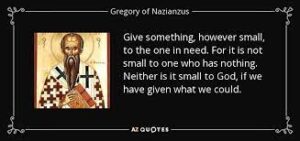
“But why would anyone on a joyous occasion rake over past unpleasantness and dwell on painful events horrible to experience and repellent to recall? Silence is mightier than words. It clothes the wreckage that befalls us in the deep folds of forgetfulness unless someone stirs up the painful memories for the sole purpose of edifying us by example and, as with illnesses, of helping us avoid the causes that led us to them.”

“Discussion of theology is not for everyone, I tell you, not for everyone – it is no such inexpensive or effortless pursuit. Nor, I would add, is it for every occasion, or every audience; neither are all its aspects open to inquiry. It must be reserved for certain occasions, for certain audiences, and certain limits must be observed. It is not for all people, but only for those who have been tested and have found a sound footing in study, and, more importantly, have undergone or at the very least are undergoing purification of body and soul. For one who is not pure to lay hold of pure things is dangerous, just as it is for weak eyes to look at the sun’s brightness. What is the right time? Whenever we are free from the mire and noise without, and our commanding faculty is not confused by illusory, wandering images, leading us, as it were, to mix fine script with ugly scrawling, or sweet-smelling scent with slime. We need actually “to be still” in order to know God, and when we receive the opportunity, “to judge uprightly” in theology. Who should listen to discussions of theology? Those for whom it is a serious undertaking, not just another subject like any other for entertaining small-talk, after the races, the theater, songs, food, and sex: for there are people who count chatter on theology and clever deployment of arguments as one of their amusements. What aspects of theology should be investigated, and to what limit? Only aspects within our grasp, and only to the limit of the experience and capacity of our audience. Just as excess of sound or food injures the hearing or general health, or, if you prefer, as loads that are too heavy injure those who carry them, or as excessive rain harms the soil, we too must guard against the danger that the toughness, so to speak, of our discourses may so oppress and overtax our hearers as actually to impair the powers they had before.”

“God always was, and always is, and always will be. Or rather, God always Is. For Was and Will be are fragments of our time, and of changeable nature, but He is Eternal Being. And this is the Name that He gives to Himself when giving the Oracle to Moses in the Mount. For in Himself He sums up and contains all Being, having neither beginning in the past nor end in the future; like some great Sea of Being, limitless and unbounded, transcending all conception of time and nature, only adumbrated [intimated] by the mind, and that very dimly and scantily.”

“May God preserve me from being rich while they are indigent, from enjoying robust health if I do not try to cure their diseases, from eating good food, clothing myself well and resting in my home if I do not share with them a piece of my bread and give them, in the measure of my abilities, part of my clothes and if I do not welcome them into my home.”

“If anyone does not believe that Holy Mary is the Mother of God, he is severed from the Godhead. If anyone should assert that He passed through the Virgin as through a channel, and was not at once divinely and humanly formed in her (divinely, because without the intervention of a man; humanly, because in accordance with the laws of gestation), he is in like manner godless.”

“It is difficult to practice obedience; but it is even more difficult to practice leadership.”
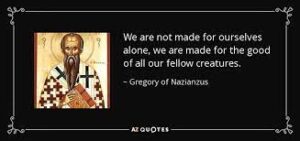
“…God will be ‘all in all’ (I Corinthians 15:28) when we are no longer what we are now, a multiplicity of impulses and emotions, with little or nothing of God in us, but are fully like God, with room for God and God alone. This is the ‘maturity’ (Colossians. 1:28) towards which we speed.”

“Almost every sin is committed for the sake of sensual pleasure; and sensual pleasure is overcome by hardship and distress arising either voluntarily from repentance, or else involuntarily as a result of some salutary and providential reversal. ‘For if we would judge ourselves, we should not be judged; but when we are judged, we are chastened by the Lord, so that we should not be condemned with the world.'” (1 Corinthans 11:31-32)
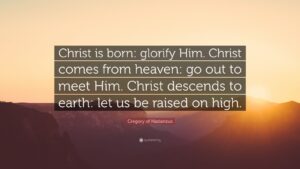
“Such is the grace and power of baptism; not an overwhelming of the world as of old, but a purification of the sins of each individual, and a complete cleansing from all the bruises and stains of sin. And since we are double-made, I mean of body and soul, and the one part is visible, the other invisible, so the cleansing also is twofold, by water and the Spirit; the one received visibly in the body, the other concurring with it invisibly and apart from the body; the one typical, the other real and cleansing the depths.”

“I seem indeed to hear that voice, from Him Who gathers together those who are broken, and welcomes the oppressed: ‘I have given you up, and I will help you. In a little wrath I struck you, but with everlasting mercy I will glorify you’ ( Isaiah 54:8). The measure of His kindness exceeds the measure of His discipline.”
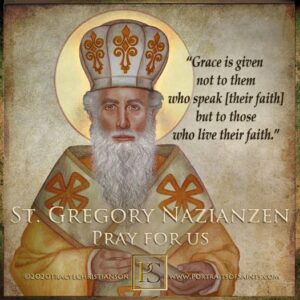
“The Son is ‘Life’ (John 14:6) because He is ‘Light’, constituting and giving reality to every thinking being. ‘For in Him we live, move and exist’ (Acts 17:28) and there is a two-fold sense in which He breathes into us (Genesis. 2:7; John 20:22); we are filled, all of us, with His breath, and those who are capable of it, all those who open their mind’s mouth wide enough, with His Holy Spirit.”
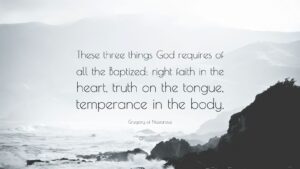
“… I gave as an offering my all to Him Who had won me and saved me, my property, my fame, my health, my very words… In considering all these things, I preferred Christ. And the words of God were made sweet as honeycombs to me, and I cried after knowledge and lifted up my voice for wisdom. There was moreover the moderation of anger, the curbing of the tongue, the restraint of the eyes, the discipline of the belly, and the trampling under foot of the glory which clings to the earth.”
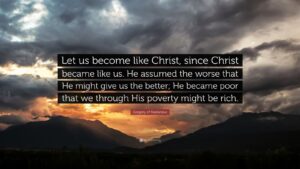
“No one has yet discovered or ever shall discover what God is in His nature and essence… we shall, in time to come, ‘know as we are known’ (I Corinthians 13:12). But for the present what reaches us is a scant emanation, as it were a small beam from a great light – which means that any one who ‘knew’ God or whose ‘knowledge’ of Him has been attested to in the Bible, has a manifestly more brilliant knowledge than others not equally illuminated. This superiority was reckoned knowledge in the full sense, not because it really was so, but by the contrast of relative strengths.”

“When one has looked upon Jesus, though he be of little stature like Zacchaeus of old (Luke 19:3), and climb up on the top of the sycamore tree by mortifying his members which are upon the earth (Colossians 3:5), and having risen above the body of humiliation, then he shall receive the Word, and it shall be said to him, This day has salvation come to this house (Luke 19:9). Then let him lay hold on the salvation, and bring forth fruit more perfectly, scattering and pouring forth rightly that which as a publican he wrongly gathered.”
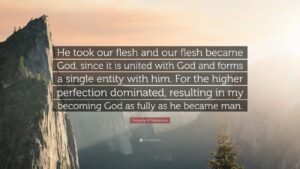
“May you be children of God, pure and unblameable, in the midst of a crooked and perverse generation (Philippians 1:15): and may you never be entangled in the snares of the wicked that go round about, or bound with the chains of your sins. May the Word in you never be smothered with the cares of this life and so make you unfruitful: but may you walk in the King’s Highway, turning aside neither to the right hand nor to the left, but led by the Spirit through the narrow gate.”
+ + + + + + +
Next Week: As hard as this may be to believe, we’re coming to Zacchaeus Sunday when we begin * to begin * to begin * to begin * to get ready for Holy Pascha.
- I think I’ve got this right.
Week after Next: Saint Mark of Ephesus